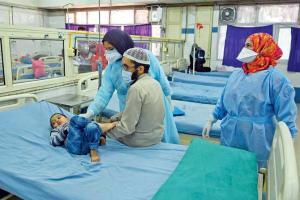Children isolated in COVID-19 rehab centres or kids of medical practitioners out on frontline duty are tackling anxiety and fear by reaching out to tele-counsellors linked to a new kids national helpline

A nurse tends to a minor patient at GB Pant children hospital in Srinagar. Pic/AFP
When a 17-year-old girl was diagnosed with the COVID-19 infection in September, she maintained her cool. She knew that by observing strict self-isolation and hygiene measures, she would trump the virus. Exactly two weeks later, she recovered. Just when she thought the worst was over, she tested positive for dengue. This resulted in sudden insomnia, something she had never experienced. "When she called our helpline number, she was worried and clueless. Our counsellor built a rapport, and began probing the psychological issues she was facing after COVID-19 treatment. We advised her to practice breathing exercises twice a day and she was asked to eat lighter foods for dinner. After a couple of follow-up sessions, she managed to break out of sleeplessness," says Priyank Kanoongo, chairperson, National Commission for Protection of Childs Rights (NCPCR).
NCPCR is a statutory body constituted under the provisions of the Commissions for Protection of Child Rights (CPCR) Act, 2005 for protection of child rights and other related matters. When the nationwide lockdown was announced in March, the team at NCPCR realised that the pandemic would take a psychological toll on children. They decided to start identifying counsellors across the country. "We thought of starting an exclusive counselling platform for kids. Unfortunately, there is a dearth of psychiatrists; very little work has happened in this sphere in the last few decades," says Kanoongo. To their good fortune, the team learnt of the work of India Co-Win Action Network (I-CAN), a voluntary group that assists in immediate relief and support during the pandemic. "A lot of psychiatrists are registered with them. They agreed to partner with us," he adds.

Priyank Kanoongo
In September, NCPCR launched the tollfree helpline, SAMVEDNA (Sensitising Action on Mental Health Vulnerability through Emotional Development and Necessary Acceptance). The tele-counselling service provides psychological first-aid and emotional support specifically to children who are in quarantine or at COVID care centres, children who have COVID-19 positive family members, or those who have lost a member to the infection. A total of 30 counsellors are available via the helpline on pro bono basis. "We have received about 500 calls so far. The counselling support caters to children all over India, including in regional languages also." The service is active between 10 am and 1 pm, and 3 pm and 8 pm.
The counsellors are trained by an expert team of the National Institute of Mental Health and Neuro-Sciences (NIMHANS), because while they are experts in their field, the pandemic is new to everyone, and the problems related to it, too. Stress, anxiety, fear and loneliness are the chief concerns addressed, while the maximum calls come from children alone and recovering at COVID-19 rehab centres.
Interestingly, they also get calls from children whose parents are medical professionals. Either both parents are doctors, leaving them alone at home, or they may have lost a parent to the infection; it leads to feelings of anger and fear. "Our counselling, we hope, stops them from slipping into acute trauma. We are socially dependent on our parents, siblings and friends. The children are left emotionally vulnerable. This is the most unfortunate outcome of the Coronavirus infection—it isolates you," Kanoongo says.
In a study to have emerged from China, published in JAMA Pediatrics, researchers in Hubei province, where the pandemic originated, examined a sample group of 2,330 schoolchildren for signs of emotional distress. The children had been locked down for what seems like a relatively short period—an average of 33.7 days. But, 22.6 per cent of them reported depressive symptoms and 18.9 per cent were experiencing anxiety.
Samvedna Toll-Free Helpline 1800-121-2830
Keep scrolling to read more news
Catch up on all the latest Mumbai news, crime news, current affairs, and a complete guide from food to things to do and events across Mumbai. Also download the new mid-day Android and iOS apps to get latest updates.
Mid-Day is now on Telegram. Click here to join our channel (@middayinfomedialtd) and stay updated with the latest news
 Subscribe today by clicking the link and stay updated with the latest news!" Click here!
Subscribe today by clicking the link and stay updated with the latest news!" Click here!







